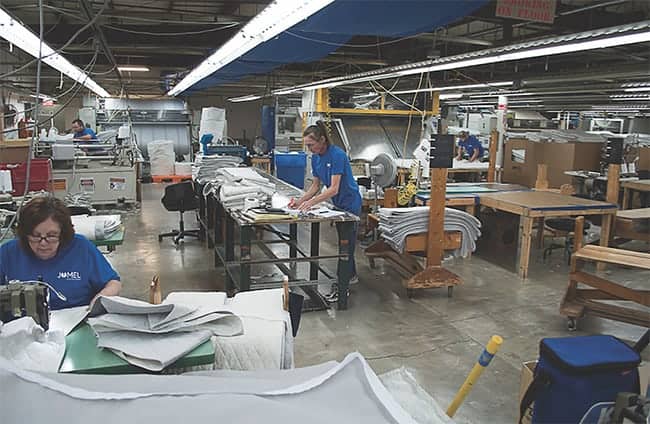BY GARY JAMES
This supplier of traditional bedding components now does a big business in the growing sewn covers segment.

The management team at Hillside, New Jersey-based Jomel Industries includes (from left) Bill Smith, vice president of sales; Jeff Spitz, vice president; and Phil Iuliano, president. Iuliano and Spitz founded the company.
Known for its diverse line of bedding components, including corner guards, handles and zippers, Jomel Industries also has become a significant player in bed covers during the past five years.
Jomel entered the bed cover business in 2012 with the purchase of Seams Reasonable, a cut-and-sew company with a small facility in Red Boiling Springs, Tennessee, that specialized in point-of-purchase soft goods and other products for the bedding industry. The owner wanted to retire, and Jomel President Phil Iuliano liked the idea of expanding his company’s line to include foot protectors, pillow shams and bolsters that could be designed to coordinate with its other bedding products.

Soon after the acquisition, however, the boxed-bed trend took off. As demand for zippered covers for shippable and other foam beds soared, the new division—now called Jomel Seams Reasonable—expanded its mix to include quilted sewn covers. In 2016, the division moved operations to a much larger 68,000-square-foot production facility in Burkesville, Kentucky, to increase capacity. A second 20,000-square-foot cut-and-sew operation in Trinity, North Carolina, was acquired in 2015 to handle the production of smooth-top bed covers and POP products.
Today, Jomel Seams Reasonable provides zippered covers, along with coordinating POP items, to a “who’s who” of foam bedding producers, both e-commerce and traditional players. With sales having quadrupled in the past four years and an increase of 15% to 20% projected for 2017, Jomel Seams Reasonable accounts for a substantial and growing portion of Jomel Industries’ total business, Iuliano says.
“Zippered covers—both quilted and smooth-top knit models—have become a large part of our sales,” says Iuliano, who co-founded Jomel Industries in 1993 with Jeff Spitz, Jomel’s vice president. The partners combined elements from their children’s names (Joseph and Michael Iuliano and Jordan and Melissa Spitz) to create the name Jomel for their company.
Jomel Industries sells a wide range of bedding components. In addition to corner guards, handles and zippers, it offers nonwoven fabrics, such as filler cloth and dust cover rolls; innerspring units; ventilators and washers; ticking; high-loft FR fiber; and edge supports. And it’s an authorized distributor of FR fabrics for Tietex International. The company also provides services, including automated panel cutting and liquidation of finished goods and raw materials.
“Over the years, we’ve evolved into a true one-stop shop for anything a bedding producer might need to produce a quality mattress or foundation,” Iuliano says.
Jomel Industries’ roots trace back to 1946, when the Spitz family launched Snapco Manufacturing Corp., a manufacturer and distributor of trimmings and closures for industrial and apparel applications. Today, Snapco shares office and warehouse space with Jomel at a 35,000-square-foot facility in Hillside, New Jersey. From the site, Jomel Industries serves a large base of small bedding producers operating in northern New Jersey and metropolitan New York, as well as customers in other markets throughout the country.
Jomel Industries also has a 12,000-square-foot plant in Leominster, Massachusetts, where it produces plastic corner guards, and a 15,000-square-foot distribution facility in Newark, New Jersey.
Going the extra mile
“We sell most of the smaller producers in the New York City area,” says Bill Smith, vice president of sales, about Jomel’s regional strength. “We maintain stock on nearly all of our Jomel bedding components and pride ourselves on getting parts in the hands of our local customers the same day they are ordered.”
As Jomel Industries delivers orders throughout the New York metro region, the company’s drivers stop to visit other customers on their routes to see if they need to replenish any supplies.
“We’re a bit like a produce vendor,” Smith says. “We keep our trucks loaded with a stock of nonwovens and other best-sellers, and if a bed producer in our home market needs something that day, we usually can provide it right on the spot.”
Personal service has been a big component of Jomel Industries’ success since the beginning, when its line consisted mostly of mattress handles, eyelets and ventilators. The company works hard to make sure its customers are satisfied with the products and service they receive.
“We started by selling small ‘mom-and-pop’ producers. Then, as our reputation grew, we moved up to working with larger manufacturers,” Iuliano recalls. As the company forged deeper relationships, opportunities appeared to expand its offerings to include corner guards, innersprings and more. “We’ve reinvented ourselves many times over the years based on what the market needs,” Iuliano says.
Jomel Industries always has been particularly strong in the Northeast, where its facilities are in easy reach of customers and bulky freight such as innersprings and filler cloth can be moved cost effectively on the company’s own trucks. But the supplier also sells a steady volume of smaller items to producers throughout the country and internationally. Going forward, Jomel will continue looking for additional bedding components to sell to deepen its one-stop shop identity. This year, it’s considering adding tape edge and thread to its mix.
“To grow, we need to find ways to become more important with our current customers while also attracting new business,” Iuliano says. “By offering a wider assortment of products, we make our customers’ lives easier and save them money.”
Growing the Jomel Industries’ side of the business has been challenging lately, though. “Retail has been consolidating in many markets, and smaller mattress producers also are finding it more and more difficult to compete,” Iuliano says.
Even so, the growth prospects for Jomel Seams Reasonable remain bright, he adds. In this business segment, the Jomel team expects recent double-digit growth to continue thanks to two trends: the increasing volume of cut-and-sew activity that is being outsourced by major and mid-tier mattress producers and the surge in new demand created by the dozens of boxed-bed purveyors that have arrived on the scene recently. Jomel Seams Reasonable has a strong base of customers in both categories.
“We’re a go-to source for a wide range of bed covers, whether they’re for a dot-com specialist or a more traditional producer,” says Lila Walker, who joined Jomel Seams Reasonable as a principal in 2015, overseeing new business development and operations. Companies increasingly are turning to Jomel Seams Reasonable for their sewn covers to simplify their manufacturing processes and reduce the need for staff and equipment—and, she says, “to get a more fashion-forward look than they can get on their own.”
During the past two years, Walker has fielded inquiries from at least two dozen boxed-bed companies. “These companies come to us with a lot of creative ideas, but they require extra patience because they don’t have much experience in bedding and need to be educated about what will work and what won’t,” she says.
When it comes to established bedding producers, the new Trump administration’s pledge to “make America great again” by favoring U.S. manufacturing also is opening new doors for Jomel Seams Reasonable. “People are very nervous about what might happen with trade tariffs,” Walker says. “The fact that we’re made in the USA gives us an advantage over competitors in Mexico and Canada. Our response times are much quicker, and the service and support we provide is hard to match.”
At both of its plants, Jomel Seams Reasonable has a “very skilled workforce capable of delivering high-quality work on time, every time,” Walker says. The Kentucky operation is led by Steve Sanders, a former Fruit of the Loom executive who joined Jomel when the garment maker closed its Jamestown, Kentucky, plant in 2014 and moved the operation to Honduras. The closure resulted in the layoff of 600 workers, some of whom now work at the Jomel Seams Reasonable facility in Burkesville.
Similarly, Jomel’s plant in Trinity, North Carolina, employs a group of former upholsterers who needed to find new work after local furniture makers moved offshore.
“We’re blessed to have a great group of experienced sewers,” Sanders says. “With their apparel backgrounds, they know how to do some very complicated sewing techniques like those used for fire and rescue uniforms.”
Still, because its workforce is aging, Jomel always is on the lookout for new workers interested in learning the craft. The company works closely with local high schools, community colleges and government agencies to identify and attract new talent.

The Jomel Industries plant in Burkesville, Kentucky, is devoted to production of quilted zippered bed covers made in its Jomel Seams Reasonable division.
An eye for fashion
With all its products, from the smallest eyelets to complete covers, Jomel aims to help its customers inject an extra touch of fashion into their finished beds. That mindset tracks back to the company’s early years, when retail bedding showrooms were, with few exceptions, a “huge sea of white,” Iuliano says.
“In the mid-1990s, every store was filled with double-sided, white quilted mattresses,” he says. Seeing a need to liven things up, Jomel decided to position itself as “the jewelry guys.”
“We encouraged customers to use decorative trim items on their borders or glitz on their handles and/or embroidery,” he says. Today, that tradition continues under Walker’s design leadership. Before joining Jomel, Walker served as national sales manager with Progressive Products, a sewn cover supplier owned by BekaertDeslee. During her career, she has worked with top mattress brands, as well as regional manufacturers.

Lila Walker, who joined Jomel Seams Reasonable as a principal in 2015, describes the division as a ‘go-to source’ for sewn bed covers for both online sellers of boxed beds and traditional mattress manufacturers.
“We were ecstatic to have Lila join us as a company principal,” Iuliano says. “She has great industry experience, talent and passion. Together, we make a strong team. Jeff is the factory floor and equipment expert; Lila is our creative force, as well as our sales driver; and my strength is business and management.”
In addition to regular on-site visits with customers, Jomel’s three leaders travel to each of Jomel’s facilities at least once a month. “When we come into a plant, we often can identify new ways of doing things since we’re seeing things with fresh eyes,” Iuliano says.
At the same, Jomel’s 100-person workforce is a rich source of ideas—both for improving efficiencies and for executing new product designs.
“We’re constantly coming up with new ideas for how to make mattresses more attractive,” Walker says, adding that while some producers know exactly how they want their covers to look, others are eager for Jomel’s input. “Working together, we can come up with looks that are fresh, distinctive and current with market trends,” she says.
As part of the design process, Walker works closely with leading fabric and ticking suppliers. “Since we’re independent, and not owned by a larger ticking supplier like some of our competitors, we work with all the major fabric suppliers,” she says. “This gives us a wider range of design options to explore, whether it’s blister fabrics on borders or leather piping. Since we’re not tied to any one supplier, we can mix and match fabrics from whoever does it best.”
And, because Jomel offers a wide range of products besides covers, including POP items, the company can offer customers a completely coordinated bed package. “A lot of people sew covers and others do POP, but there aren’t many companies that do both,” Walker says.
Today, more than ever, fashion is playing a starring role in mattress design, particularly in brick-and-mortar stores. “And it’s not just covers,” Iuliano says. “Corner guards and handles also have become jewelry items, since they are another place where you can add a logo or other embellishment.”




